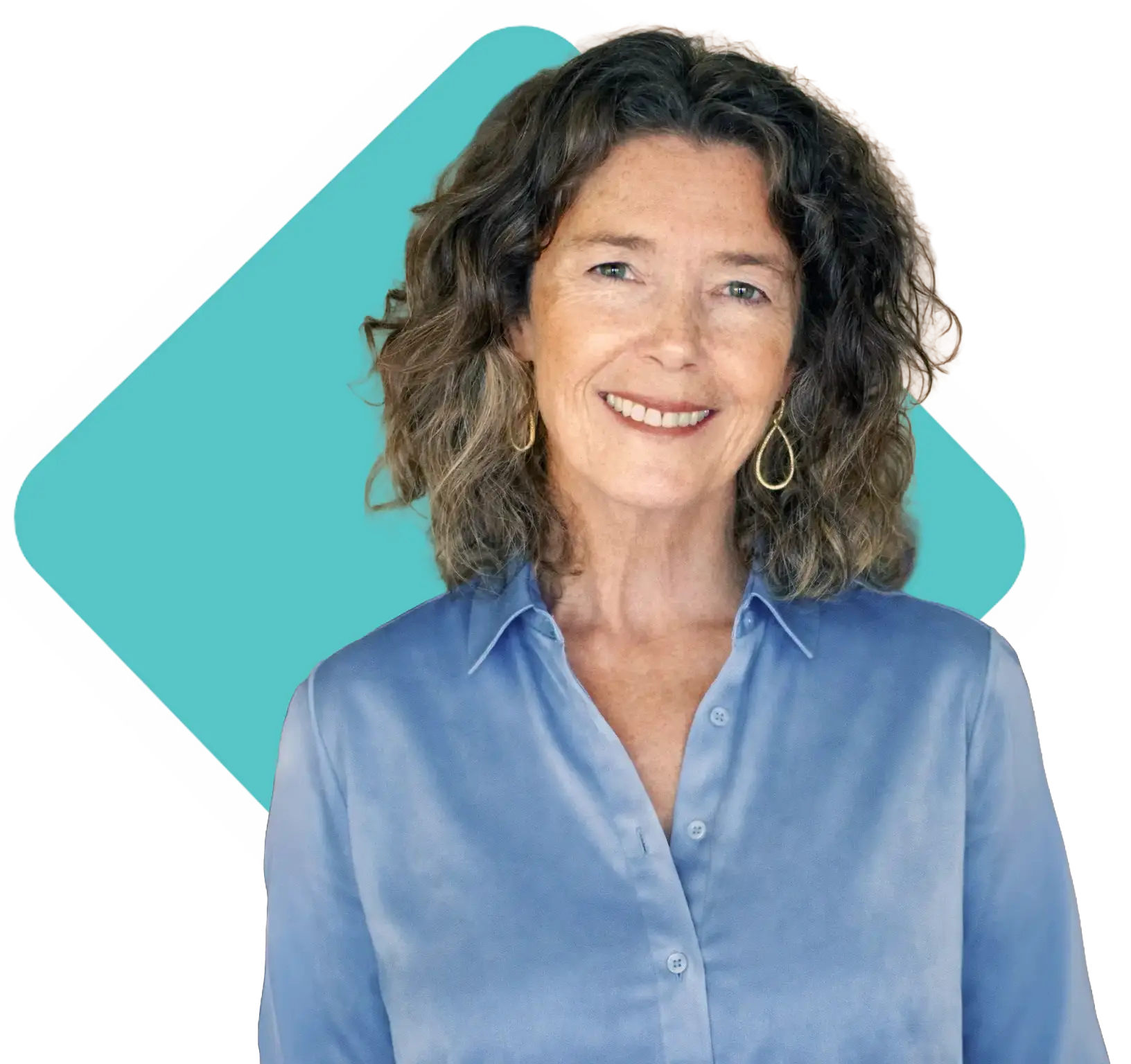
NEW Training - Join Dr. Liz George LIVE!
Healing the Longing for Belonging
Uncovering Secure Attachment for Ambivalent Adaptations
A body-based, experiential workshop for understanding ambivalent patterns and cultivating a felt sense of secure connection—with yourself and others.
We begin with the bonus SoulCollage® workshop on February 28, and start Class 1 on March 4, 2026.
Healing Ambivalent Attachment Through Embodied Awareness and Sustainable Connection
Why does closeness still feel uncertain even when love is present?
For many people with ambivalent attachment patterns, the longing for connection is strong and sincere. You may care deeply, invest fully, and want closeness more than anything—yet still find yourself feeling unsettled, anxious, or dissatisfied in relationship. Reassurance is offered, but it doesn’t quite land. Intimacy is there, yet your body stays on edge, scanning for what might shift or disappear.
This can be confusing and exhausting. Especially if you’ve done meaningful self-work already—therapy, reflection, insight—you might wonder why understanding your patterns hasn’t translated into a steadier felt sense of security, or changed how your body responds when connection feels vulnerable or uncertain.
The challenge is that ambivalent attachment isn’t just a set of thoughts, beliefs, or behaviors. It’s a nervous-system pattern that developed in response to inconsistency—times when care, availability, or attunement were present sometimes, and absent at others. Over time, the system learns to stay oriented toward connection through heightened sensitivity, vigilance, and emotional reach. Longing and alertness become intertwined.
Because these patterns are organized in the body, they can’t be resolved through insight alone. True change requires felt experiences that help the nervous system register safety, protection, and connection as real and reliable.
This is the focus of Liz George’s three-part experiential workshop—Healing the Longing for Belonging—beginning March 4, 2026.



Rather than asking you to analyze your attachment patterns from the outside, this series works from the inside out—supporting your nervous system in learning new possibilities for regulation, boundaries, and belonging.
Across three live sessions, you’ll explore how ambivalent patterns show up in your body and relationships, and engage in guided practices that support a growing sense of steadiness and secure connection.
Whether you’re on a personal healing journey, supporting a partner with ambivalent tendencies, or working clinically with these dynamics, this workshop offers a grounded, non-shaming path toward connection that feels safer, clearer, and more sustainable over time.
What Sets This Training Apart...
Move beyond insight and support secure attachment through direct nervous system experience.
- Direct nervous system experience grounded in polyvagal and attachment science Attachment patterns live in the body. Each session integrates polyvagal-informed regulation with attachment understanding through guided, embodied practices that help you notice and shift responses in real time.
- Practical tools for the moment you’re activated You’ll learn simple, accessible practices to support regulation when emotions spike or connection feels uncertain, alongside ways to build resilience over time, not just in crisis.
- A clear path toward secure attachment The three sessions build intentionally from self-regulation, to healthy protection and boundaries, to belonging and connection, offering a coherent arc toward secure relationships.
- Grounded, non-shaming understanding of ambivalent patterns Ambivalent attachment is approached as a survival adaptation, not a flaw. The work emphasizes compassion, dignity, and choice, helping reduce shame while supporting meaningful change.
- Multidisciplinary and multimodal by design Teaching, reflection, somatic practice, creative exploration, and small-group dialogue work together to engage insight, implicit learning, and deep integration.
- Relevant for personal healing and relational or clinical work Whether you’re focused on your own relationships, supporting a partner, or working professionally with clients, the practices and perspectives translate naturally across contexts.

—All-New Online Training Now Open—
Healing the Longing for Belonging
Uncovering Secure Attachment for Ambivalent Adaptations
3-Session LIVE course beginning March 4, 2026
Build a felt sense of secure attachment—through regulation, boundaries, and connection.
What You Get For Only $79…
Three 90-minute LIVE Experiential and Interactive Training Sessions
Each live session combines clear teaching with embodied exploration, helping you understand ambivalent attachment through direct nervous-system experience. Rather than talking about patterns from a distance, you’ll be guided to notice how regulation, boundaries, and connection show up in your own body and relationships.
Across the three sessions, Liz introduces practical, accessible practices that support steadiness in moments of activation, alongside reflective exercises that deepen awareness over time. Teaching is woven with guided inquiry, and relational reflection, so insights land at both a cognitive and felt-sense level—“in the bones.”
Each class includes space for live Q&A, so you can explore how the work applies to personal healing, relationships, or clinical contexts. The result is a learning environment that is grounded, responsive, and shaped by what emerges in the room.
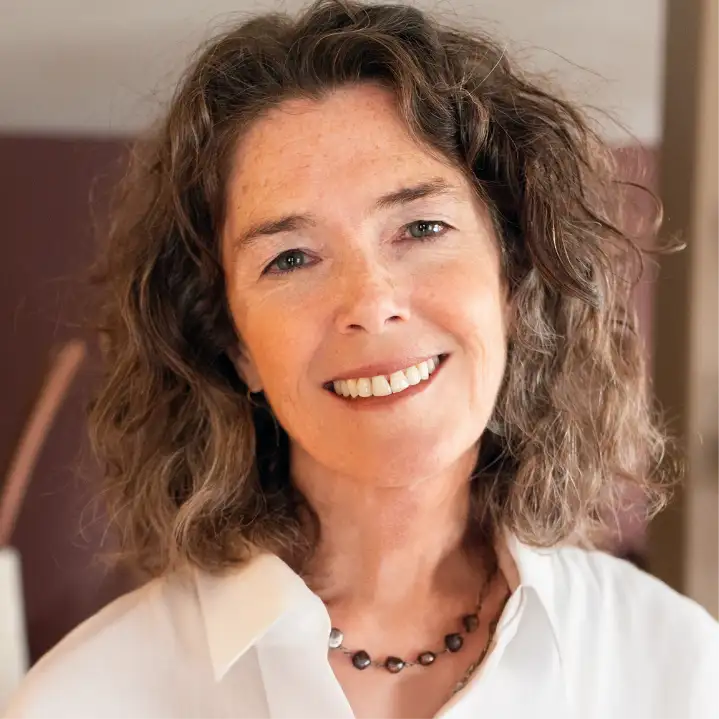
BONUS Workshop: Embodied Attachment Through SoulCollage®
This live bonus session introduces SoulCollage®, a creative and therapeutic exploration and healing tool developed by Seena Frost. Liz will introduce the SoulCollage® process as a method for deepening embodied learning throughout the course, and a pathway to accessing inner experience without relying on analysis or words—engaging mind, body, heart, and imagination together.
In this guided workshop, Liz will help you through creating your first card, using images to explore attachment patterns and inner resources that support greater regulation and security. You’ll learn the basic principles of the method, experience a guided meditation and reflective prompts, and practice “meeting” your card as a living source of insight.
Each core class in the workshop will then offer a new card prompt, allowing the learning to unfold and integrate over time—visually, somatically, and relationally.


After-Class Group Breakouts & “Put It Into Practice” Exercises
Each live session is followed by guided small-group breakouts, offering space to reflect, share insights, and connect with others who are working with similar patterns.
Participants are invited to reflect from their lived experience of the material and notice how their nervous system responds in connection. These groups are designed to support integration and belonging through relational presence—helping the work land beyond individual insight.
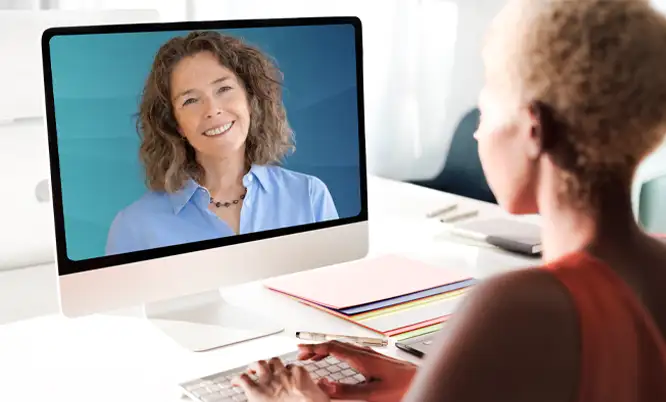
Learn Practical Clinical Skills, Resources, and Techniques
Throughout the course, Liz will share a wide range of practical tools drawn from attachment theory, polyvagal-informed practice, somatic psychology, and relational work.
Each session includes “Put It Into Practice” reflections and exercises that help translate learning into lived experience, supporting confidence, clarity, and continuity between sessions. Whether for personal healing, relationships, or clinical work, these resources are designed to be adaptable, embodied, and immediately applicable.
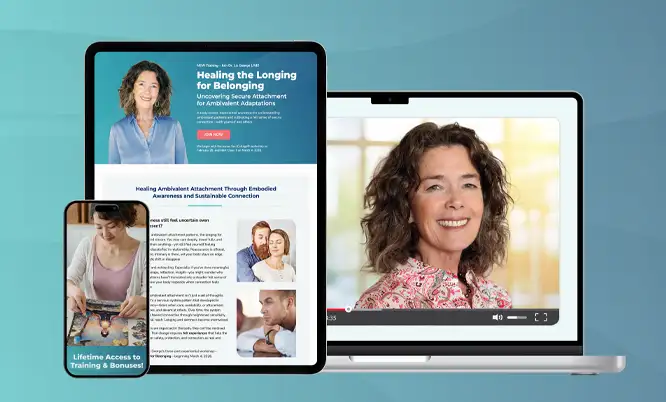
Lifetime Access to Video, Audio, Transcripts & Bonuses
If you miss a session or want to revisit a guided practice, demonstration, or group reflection, you can return to the material at any time. Many participants find that revisiting the practices allows new layers of integration to unfold as their nervous system settles and learning deepens.
You can engage the content at your own pace, repeat exercises as often as needed, and continue strengthening regulation, boundaries, and secure connection long after the live sessions conclude.
Learn directly from Dr. Liz George in this focused 3-Session LIVE Training

All for only
$79
(One-time payment with lifetime access!)
- 3 LIVE 90-minute training sessions
- Private Course Portal with Downloadable Access to Video Recordings, Audio and Transcripts
- 3 Exclusive Bonuses: SoulCollage® Workshop, Compassionate Communication Guide, and Downloadable Guided Audio Practices
- No-Risk 100% Money-Back Guarantee
We begin with the bonus SoulCollage® workshop on February 28, and start Class 1 on March 4, 2026.
Enrollment ends March 3rd.
Can’t attend live? All training is recorded and available in your learning portal.
This is the only time this training will be offered live—secure your seat today!

You’re protected by our 100% Satisfaction Guarantee
We’re confident this program will be a valuable investment in your education and clinical practice.
Try Healing the Longing for Belonging: Uncovering Secure Attachment for Ambivalent Adaptations 100% risk-free.
If, for any reason, you don’t feel this training meets your needs, please contact our Customer Support Team within 5 days of the first class, on or before Monday, March 9, 2026, and we will gladly issue a full refund.

Here’s What You’ll Learn in Each Live Session
Led by Dr. Liz George, psychologist, Somatic Experiencing Practitioner (SEP), DARe-Certified Provider, and expert in attachment-based relational healing.
All LIVE sessions meet online for 90 minutes (dates and times listed below)

Session 1: Wednesday March 4, 2026 @ 5 - 6:30 pm MT
Self-Regulation: The Foundation of Secure Attachment
This first class focuses on the ambivalent attachment adaptation and how it commonly shows up in relationships. Participants will explore ventral vagal anchors through discussion and journaling, supporting greater nervous system regulation.
You’ll gain practical, in-the-moment strategies to pause and return to self-regulation when triggered, along with simple daily practices to build resilience over time. You’ll experience embodied practices that support a direct experience of returning to regulation.
The session concludes with discussion and practices focused on creating a secure attachment with Self and developing a reliable inner secure base.
What You’ll Learn:

- The 4 types of regulation and how they relate to the different attachment styles
- How to build regulatory anchors that help you return to regulation
- Practices to help in the moment, after a trigger, and for ongoing resilience
- The role of presence and attunement in creating the conditions for regulation and repair
Session 2: Wednesday March 11, 2026 @ 5 - 6:30 pm MT
Healthy Boundaries and Self-Protection
This session will focus on the role of boundaries in creating a felt sense of safety, particularly for those with an ambivalent attachment adaptation, where boundaries may tend to be porous or inconsistent. You’ll explore how boundary patterns show up in everyday relationships and how these patterns relate to attachment and nervous system regulation.
You’ll learn to identify your own boundary tendencies and how to establish more protective, supportive boundaries. Liz will guide an embodied practice to create a “competent protector”—an internal resource that supports clarity, protection, and a sense of safety in relational interactions.

You’ll also gain clear, structured communication strategies to support boundaried interactions with others, and practices focused on creating a safe haven within self—a reliable internal place to remain tethered to, or return to, after relational engagement.
What You’ll Learn:
- Different boundary styles (porous and rigid) and how they relate to attachment adaptations
- How to recognize your own boundary patterns in specific relationships
- How to develop and work with a competent protector as a source of safety and protection
- A practical model for boundaried communication based on observation, emotional awareness, needs, and requests
Session 3: Wednesday March 18, 2026 @ 5 - 6:30 pm MT
Developing Self-Connection and Communities of Care
This final session focuses on the third aspect of secure connection: the role of belonging and community in healing attachment patterns. You’ll learn the impact of isolation and disconnection on our health, well-being, and relational resilience, and see how attachment adaptations are shaped not only in close relationships, but across broader spheres of belonging over time.
Dr. George will lead a guided reflection on the different spheres of belonging and how experiences of connection, exclusion, or inconsistency within these spheres have influenced your attachment responses.

An embodied practice supports the creation of an “ally oasis” of inner resources—reliable internal supports that foster grounding, safety, and connection.
Reflections will help you recognize existing sources of support in your external world and explore strategies for building communities of care that align with your needs and capacities.
- How isolation and lack of belonging impact health and attachment over time
- The different spheres of belonging and how attachment patterns may have formed within them
- How to build an inner ally oasis as a source of grounding and secure connection
- How to recognize and strengthen existing external supports and communities of care
Join our learning community, and apply attachment, polyvagal, and somatic insights into the healing journey—for yourself, your clients, or someone you love or care for.
Enrollment is open until March 3, 2026
PLUS you’ll also get these Special Bonus Resources!

BONUS #1
Guided Workshop: Embodied Attachment Through SoulCollage® with Dr. Liz George
Saturday February 28, 2026 @ 10 am – 12 pm MT
This live and experiential bonus class offers an introduction to the process of SoulCollage® as a new practice for working with attachment. You’ll learn a creative and embodied framework you can draw on throughout the full course, with SoulCollage® prompts given in each class.
The creative process offers a multimodal way to learn—engaging image, body awareness, reflection, and meaning-making—so key attachment concepts are not just understood, but felt and integrated over time.
You’ll get an overview of SoulCollage®, its origins, and core principles. Then, Dr. George will guide you through creating your first card—using images to access implicit memory and right-brain processes that support deeper learning and neuroplastic change.
After this class, participants can continue using SoulCollage® practices alongside the course material, allowing insights to deepen and unfold as the workshop progresses.

- The foundations of SoulCollage® and its role in embodied attachment work
- How creative, image-based practices support secure attachment learning
- Ways SoulCollage® can reveal attachment adaptations and inner resources
- How to create and work with your personal deck of cards throughout the course
BONUS #2
Compassionate Communication Strategies for Ambivalent Patterns
A practical, easy-to-use guide for working with ambivalent patterns
This downloadable guide offers clear communication tools for navigating moments of relational urgency—whether you recognize ambivalent patterns in yourself, your partner, or your clients. Grounded in attachment and nervous-system awareness, the handout focuses on reducing escalation, increasing steadiness, and preserving connection without blame or over-explaining.
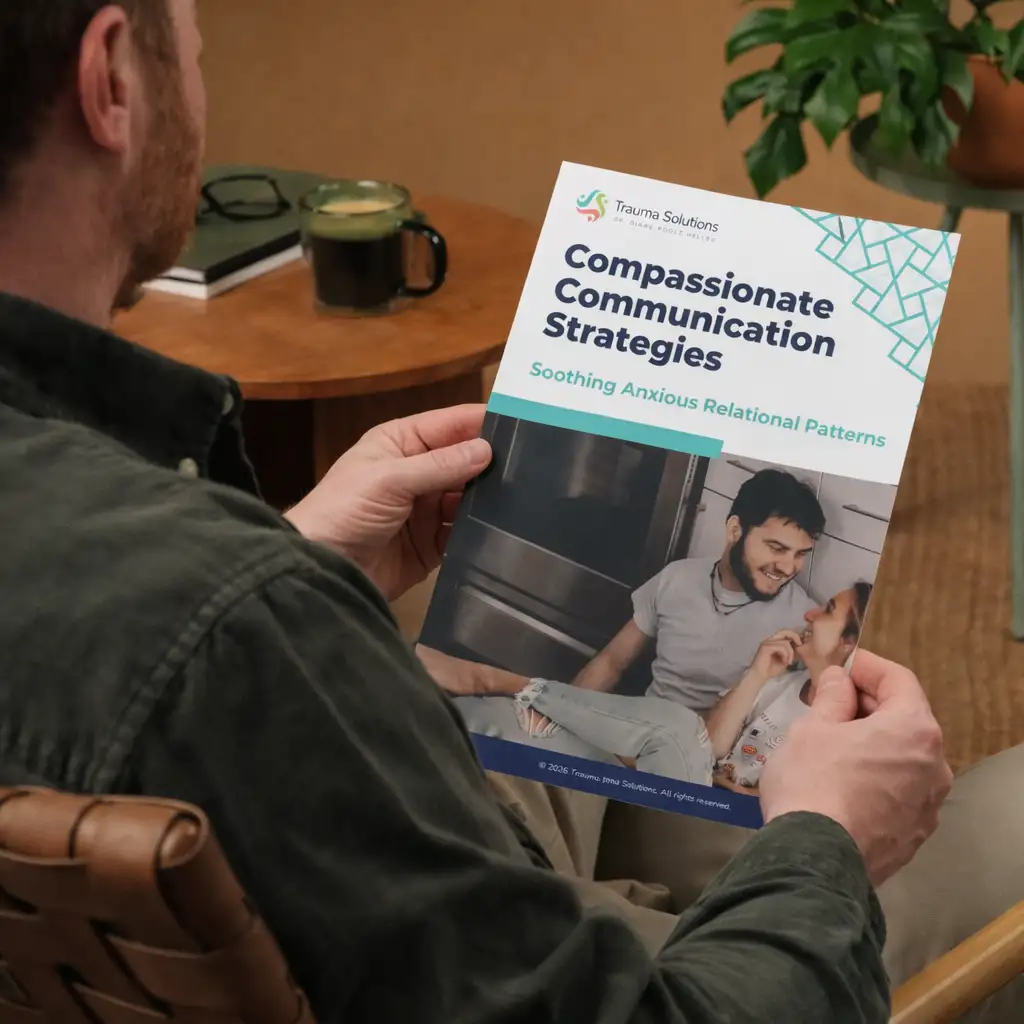
You’ll find guidance on settling anxious activation, expressing needs clearly without pressure, and building safety through consistency rather than intensity. The strategies and prompts help conversations feel more grounded, supportive, and sustainable—especially during moments when connection feels most vulnerable.
BONUS #3
Guided Audio Practices for Ongoing Support
Return to the practices whenever you need support
All guided experiential practices from the workshop are included as downloadable audio recordings, giving you lifetime access to the tools you learn in real time. These practices are designed to support regulation, grounding, and secure connection—and can be returned to whenever you need support.
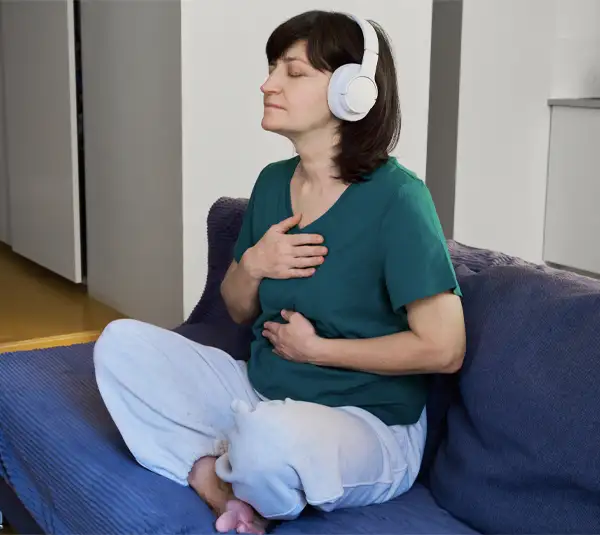
Whether you’re navigating moments of activation, preparing for a difficult conversation, or simply reinforcing steadiness over time, these audios allow the work to continue beyond the live sessions. Use them at your own pace, as often as needed, to deepen integration and build resilience in everyday life.
Learn directly from Dr. Liz George in this focused 3-Session LIVE Training

All for only
$79
(One-time payment with lifetime access!)
- 3 LIVE 90-minute training sessions
- Private Course Portal with Downloadable Access to Video Recordings, Audio and Transcripts
- 3 Exclusive Bonuses: SoulCollage® Workshop, Compassionate Communication Guide, and Downloadable Guided Audio Practices
- No-Risk 100% Money-Back Guarantee
We begin with the bonus SoulCollage® workshop on February 28, and start Class 1 on March 4, 2026.
Enrollment ends March 3rd.
Can’t attend live? All training is recorded and available in your learning portal.
This is the only time this training will be offered live—secure your seat today!

You’re protected by our 100% Satisfaction Guarantee
We’re confident this program will be a valuable investment in your education and clinical practice.
Try Healing the Longing for Belonging: Uncovering Secure Attachment for Ambivalent Adaptations 100% risk-free.
If, for any reason, you don’t feel this training meets your needs, please contact our Customer Support Team within 5 days of the first class, on or before Monday, March 9, 2026, and we will gladly issue a full refund.
Who Should Join Us?
Don’t miss your chance to learn directly from Dr. Liz George!
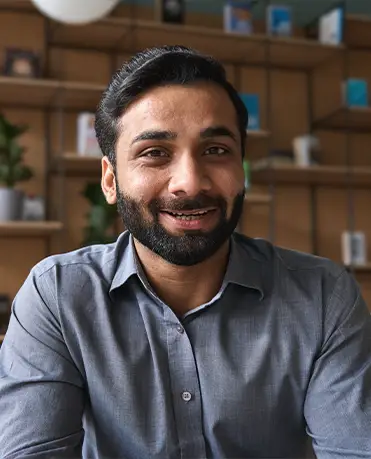
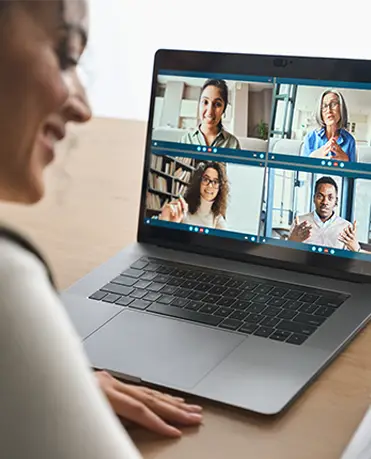
- Individuals on a personal healing journey This workshop is for anyone who longs for deeper, more secure connection and wants to understand why closeness can feel emotionally activating or hard to fully receive. You don’t need to identify with a specific attachment label, only a curiosity about how your nervous system shapes your experience of relationship, and a desire for greater steadiness and ease.
- Partners of people who experience heightened sensitivity in relationship Gain insight into why reassurance, clarity, or contact may feel especially important to your partner, and learn how to respond with consistency, grounded presence, and care, without escalating tension or losing yourself in the process.
- Therapists, counselors, and mental health professionals Deepen your embodied understanding of ambivalent attachment and how it organizes in the nervous system. Learn experiential practices and language that support regulation, boundaries, and connection, both personally and in your clinical work.
- Body-based and somatic practitioners Including massage therapists, yoga teachers, movement educators, and physical therapists who want to recognize how attachment patterns live in the body, and how nervous-system–informed practices support safety, presence, and relational ease.
- Healers, caregivers, and helping professionals Develop simple, compassionate ways to support people navigating relational sensitivity and attachment pain, grounded in regulation, attunement, and respect for the body’s pacing.
Can’t make the live classes? Join now for lifetime access to all course materials, including recordings, demos, slide handouts, and more!
Meet Your Instructor
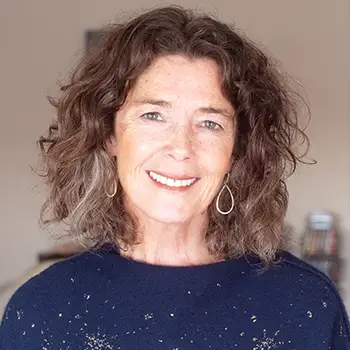
Becoming familiar with our own nervous system allows us to see how these patterns are directly connected to the way attachment is regulated.
Liz George, PhD., SEP, is a licensed clinical psychologist in private practice in Boulder, Colorado, and received her Ph.D. in Clinical Psychology from University of CO. She is a seeker and forever learner. She loves the process of taking all that she has learned and sharing it with others while learning from each person she engages.
Dr. George is a somatic therapist. She is a certified Brainspotting Therapist, a Somatic Experiencing Practitioner, a Somatic Resilience and Regulation for developmental trauma touch therapist, and a DARe (Dynamic Attachment Repatterning experience) Practitioner.
She is also a Certified Mindfulness Instructor, a SoulCollage® Facilitator, and a Ketamine Assisted Psychotherapy (KAP) provider. Finally, she is currently a student learning Ancestral and Cultural Lineage Healing practices, and maintains an active ecodharma Zen practice, combining spiritual work, grief and trauma healing, and activism.
Learning Secure Attachment From the Inside Out
An experiential, body-based workshop led by Dr. Liz George.
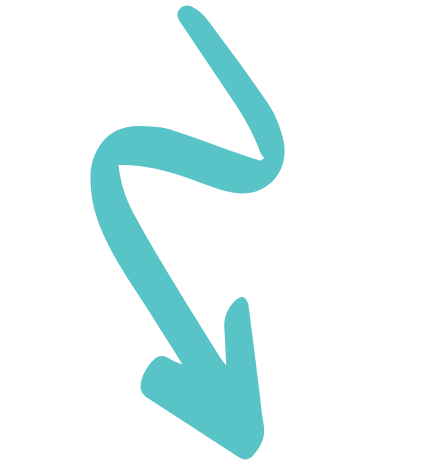
Here’s what’s included…
Healing the Longing for Belonging
Uncovering Secure Attachment for Ambivalent Adaptations
A 3-Part LIVE & Experiential Workshop on Ambivalent Attachment with Dr. Liz George Beginning March 4, 2026
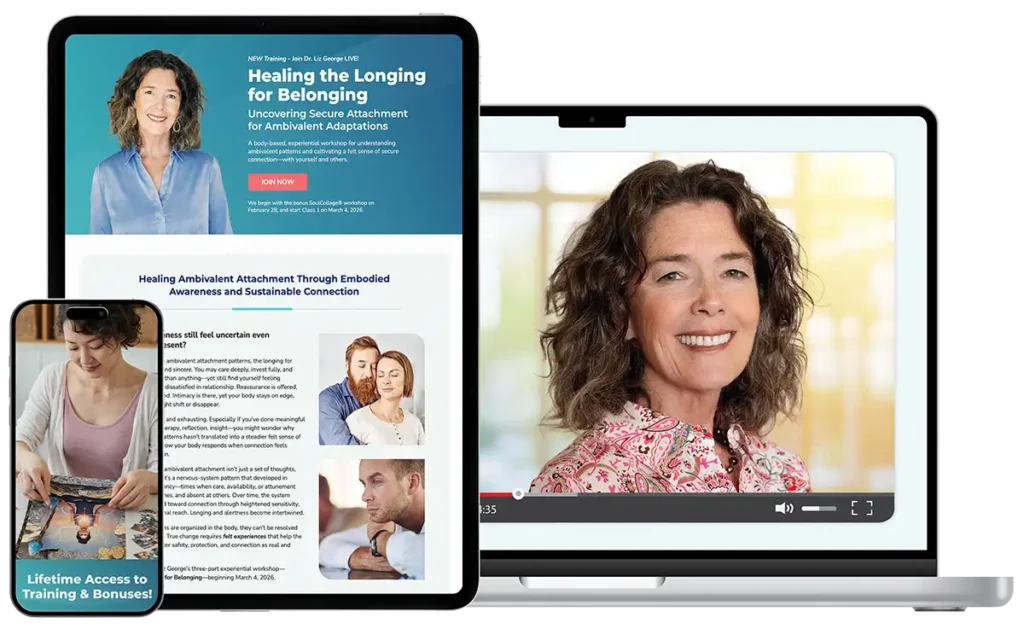
Three LIVE 90-minute sessions + Bonuses Just $79!
A live, interactive course examining ambivalent attachment in the nervous system and the path toward secure connection.
Join Dr. George for three live online sessions that combine clear teaching with guided somatic practices, reflection, and relational inquiry. Each class focuses on a core building block of secure attachment—self-regulation, healthy protection and boundaries, and belonging—supporting learning that unfolds progressively over time.
Rather than observing from a distance, you’ll be invited into direct nervous-system experience through embodied exercises, journaling, and guided inquiry. Each session also includes space for live Q&A, allowing the teaching to respond to what’s emerging in the group.
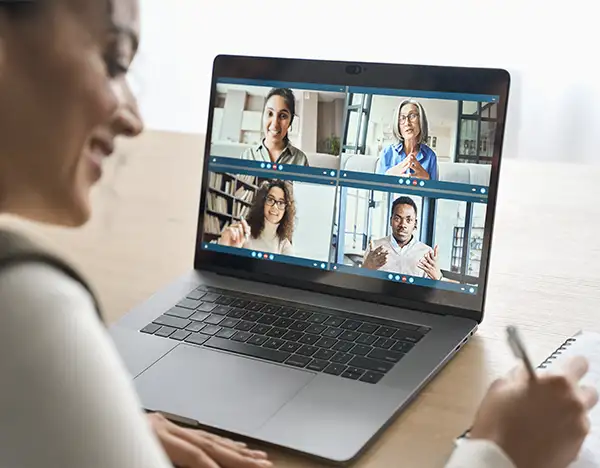
After-Session Group Breakouts for Integration and Connection
Following each class, participants are invited into small-group breakouts to reflect on learnings, share insights, and integrate the material in connection with others.
These groups offer a supportive space to practice staying present, grounded, and relational—helping the work land beyond individual understanding.
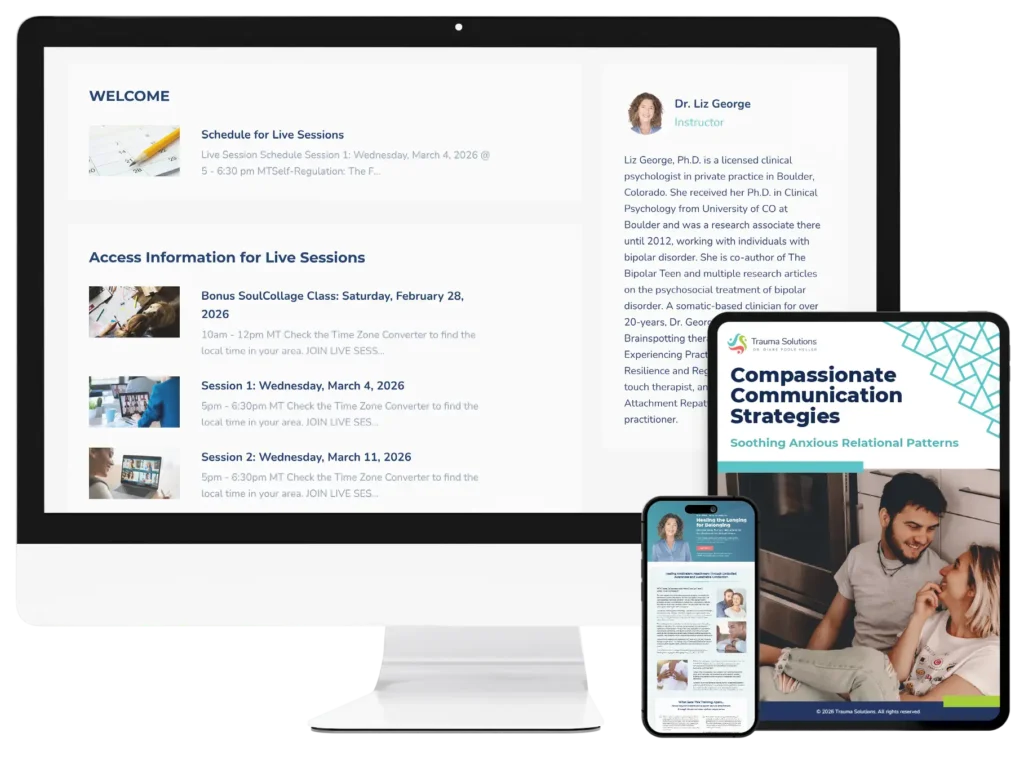
Review material, ask questions, and receive support in your private course portal.
Private Course Portal with Downloadable Access to Video, Audio, Transcripts + Additional Bonuses and Resources
Every live training will be recorded. The recorded replay will be available in video, audio and written format, so you’ll be able to access content 24/7/365.
If you miss a training session, want to download transcripts and use them for reference and note taking—or come back to trainings and demos at a later date—you’ll be able to do so at your convenience.
Plus, you’ll get additional complementary resources, worksheets and slide handouts to enhance your learning.
PLUS you’ll also get these SPECIAL COURSE BONUSES!

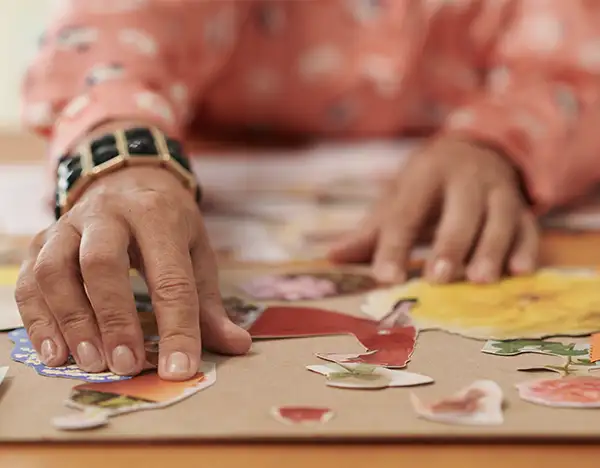
Bonus #1: LIVE Guided Workshop: Embodied Attachment Through SoulCollage® with Dr. Liz George
Join Liz in this bonus session introducing you to SoulCollage®, a creative tool for therapeutic exploration and healing. SoulCollage® offers a pathway to inner experience and attachment patterns, through creativity, interpretation, and felt sense—engaging heart, mind, and body together.
In this guided workshop, Liz will walk you through creating and “meeting” your first card, with a new card prompt to follow after each class session.
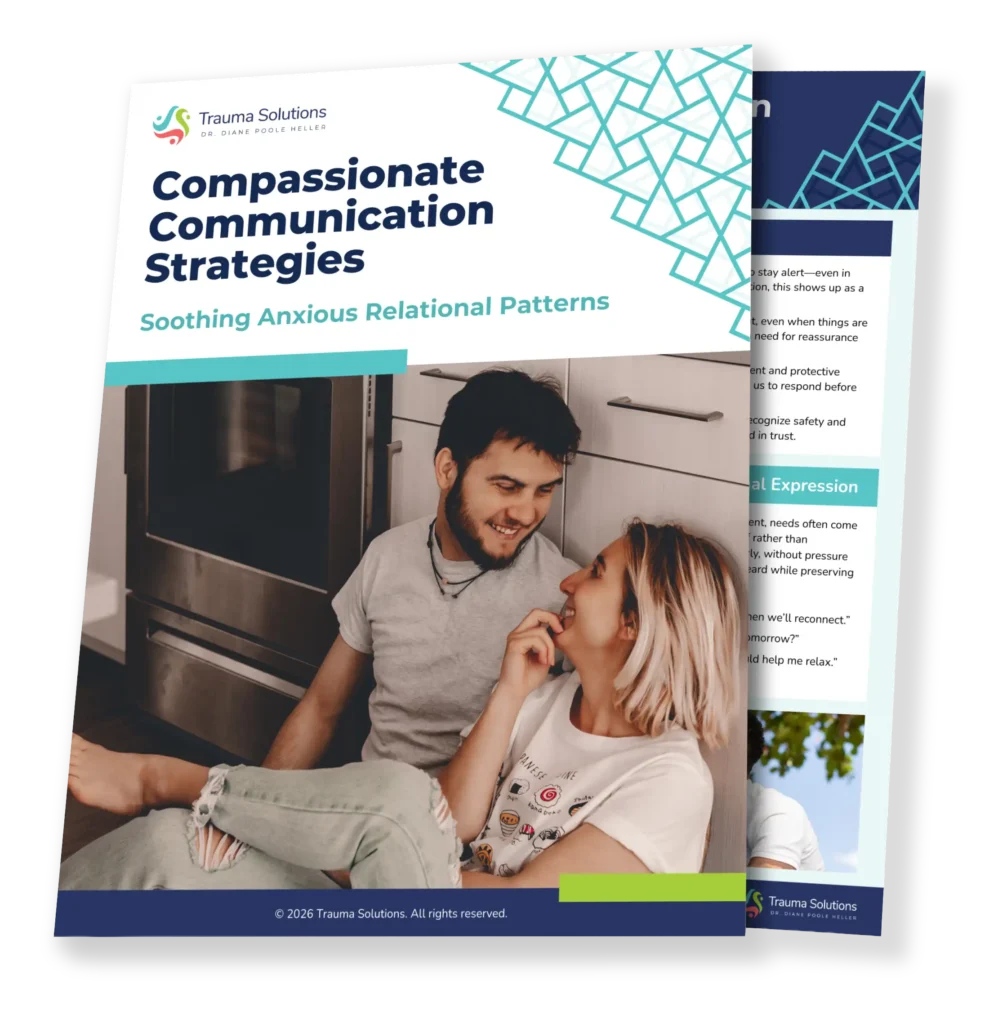
Bonus #2: Compassionate Communication Strategies for Ambivalent Patterns
A practical, easy-to-use guide for working with ambivalent patterns
This downloadable guide offers clear communication tools for navigating moments of relational urgency—whether you recognize ambivalent patterns in yourself, your partner, or your clients. Provides strategies and prompts to help conversations feel more grounded, especially when connection feels most vulnerable.

Bonus #3: Downloadable Guided Audio Practices
Guided meditations for ongoing support
All guided experiential practices from the workshop are included as audio recordings, with lifetime access. These practices can be returned to anytime—supporting regulation, grounding, and steadier connection in daily life.
This is the ONLY time this course will be offered LIVE.
Be sure to save your spot today…

Learn directly from Dr. Liz George in this focused 3-Session LIVE Training

All for only
$79
(One-time payment with lifetime access!)
- 3 LIVE 90-minute training sessions
- Private Course Portal with Downloadable Access to Video Recordings, Audio and Transcripts
- 3 Exclusive Bonuses: SoulCollage® Workshop, Compassionate Communication Guide, and Downloadable Guided Audio Practices
- No-Risk 100% Money-Back Guarantee
We begin with the bonus SoulCollage® workshop on February 28, and start Class 1 on March 4, 2026.
Enrollment ends March 3rd.
Can’t attend live? All training is recorded and available in your learning portal.
This is the only time this training will be offered live—secure your seat today!

You’re protected by our 100% Satisfaction Guarantee
We’re confident this program will be a valuable investment in your education and clinical practice.
Try Healing the Longing for Belonging: Uncovering Secure Attachment for Ambivalent Adaptations 100% risk-free.
If, for any reason, you don’t feel this training meets your needs, please contact our Customer Support Team within 5 days of the first class, on or before Monday, March 9, 2026, and we will gladly issue a full refund.
Frequently Asked Questions
How can we help you?
Do I need to be a therapist to benefit from this training?
No. This workshop is open to individuals on a personal healing journey, partners, and professionals alike. You don’t need clinical training or prior knowledge of attachment theory to participate.
The material is taught in an accessible, experiential way, with practices designed to meet you where you are. At the same time, therapists and practitioners often find the content clinically relevant and transferable. Whether you’re joining for personal growth, relational understanding, or professional development, the learning is designed to be meaningful and applicable.
How long can I access the course materials?
You’ll have lifetime access to ALL training materials, including videos, transcripts, worksheets, resources, and guided audio practices. You may also download, print, or save materials at any time for personal use.
Are the class sessions live or pre-recorded?
There are a total of three, 90-minute LIVE sessions, streamed online via Zoom, plus the bonus SoulCollage® workshop. You’ll have the chance to participate in live guided exercises, ask questions of Dr. George, and interact with your classmates in a supportive learning environment.
Am I required to attend the SoulCollage® class to take the course?
No. The SoulCollage® session is an optional bonus and is not required to participate in or benefit from the three-session workshop. The core course stands fully on its own and does not assume any prior knowledge of SoulCollage®.
That said, the bonus session is designed to introduce an additional pathway into the work—offering a creative, image-based way to engage with the material. For those who choose to attend, SoulCollage® can add a meaningful layer of exploration and integration, but participation is entirely optional and guided at a gentle, accessible pace.
What if I can’t make it to the live calls—should I still take this course?
We would love to have you join each session live, but recognize you may already have prior commitments. If you’re unable to attend, we do record all sessions (including the Q&A), so you can still receive all the information and training you need.
Many students are unable to attend all of the sessions and still find recorded training to be highly valuable and relevant to their learning goals. Additionally, the course materials are yours to download, and are saved in your personal learning dashboard, so you can come back and revisit the material any time.
Are CE credits available for the course?
The live sessions for this course have been approved for a total of 4 CE credit hours, available for purchase on our website for $89. Please see the details below for CE eligibility and requirements.
I’m having trouble completing the purchase. How can I get support?
If you have additional questions or need technical support, please contact our Customer Support Team for help.
What is the refund policy for the course?
We’re confident this program will be a valuable investment in your education, personal growth and clinical practice.
If you enroll in Healing the Longing for Belonging: Uncovering Secure Attachment for Ambivalent Adaptations and you decide to withdraw from the course for any reason, you may cancel your participation within 5 days of the course start date and request either a full refund or credit for a future course.
You must make this request in writing to our Customer Support Team on or before Monday, March 9, 2026. Refunds will be issued in the same form of payment made, and may take up to four weeks to process.
Continuing Education (CE) Credits
Licensed Mental Health Professionals
Do you need CE credits?
This course has been approved for 4 CE credit hours
Course Level: Beginning to advanced practice professionals
Target Audience: Licensed mental health professionals
Continuing Education Credit has been approved for the following professions:
-
Licensed Professional Counselors
(MUST attend live calls to be eligible)* - Licensed Clinical Social Workers

*ONLY THE LIVE ONLINE SESSIONS ARE APPROVED FOR CE CREDITS.
To be eligible, professionals must attend ALL THREE sessions. Attendance will be taken to verify eligibility.
A Certificate of Completion is available to all participants at the end of the course at no additional charge upon request.
It is the participants’ responsibility to check their individual state boards to verify CE requirements for this state. For detailed information regarding CEs, please contact our Customer Support Team.
Information on Continuing Education Credit for Health Professionals
- CE credits for psychologists are provided by the Spiritual Competency Academy (SCA) which is sponsoring this program. The Spiritual Competency Academy is approved by the American Psychological Association to sponsor continuing education for psychologists. Spiritual Competency Academy maintains responsibility for this program and its content.
- The California Board of Behavioral Sciences accepts CE credits for LCSW, LPCC, LEP, and LMFT license renewal for programs offered by sponsors of CE who are approved by the American Psychological Association.
- LCSW, LPCC, LEP, and LMFTs, and other professionals from outside of California need to check with their state licensing board as to whether or not they accept credits from programs offered by approved sponsors of CE by the American Psychological Association.
- SCA is approved by the California Board of Registered Nursing (BRN Provider CEP16887) for licensed nurses in California. RNs must retain their certificate of attendance for 4 years after the course concludes. Nurses outside of California must confirm acceptance with their licensing boards.
- For questions about your certificate or the content, logistics, or other support issues regarding this course, please contact Trauma Solutions Customer Support
- For questions about whether APA CE is valid for you, contact your licensing board directly.
- For general questions about APA CE, contact SCA at ce@spiritualcompetencyacademy.com.
Learning Objectives
By the end of this training participants will be able to:
- Demonstrate a boundaried communication model that integrates observation, emotional awareness, needs identification, and respectful requests.
- Describe the concept of a competent protector as an internal mechanism for safety, regulation, and boundary maintenance.
- Explain spheres of belonging (e.g., family, community, culture, profession) and how attachment patterns may have developed within each.
- Apply a structured model of boundaried communication by integrating observation, emotional awareness, needs identification, and clear requests.
- Explain the impact of isolation and lack of belonging on attachment, emotional regulation, and overall well-being.
Learn directly from Dr. Liz George in this focused 3-Session LIVE Training

All for only
$79
(One-time payment with lifetime access!)
- Three LIVE 90-minute training sessions
- Private Course Portal with Downloadable Access to Video Recordings, Audio and Transcripts
- 3 Exclusive Bonus: SoulCollage® Workshop, Compassionate Communication Guide, and Downloadable Guided Audio Practices
- No-Risk 100% Money-Back Guarantee
We begin with the bonus SoulCollage® workshop on February 28, and start Class 1 on March 4, 2026.
Enrollment ends March 3rd.
Can’t attend live? All training is recorded and available in your learning portal.
This is the only time this training will be offered live—secure your seat today!

You’re protected by our 100% Satisfaction Guarantee
We’re confident this program will be a valuable investment in your education and clinical practice.
Try Healing the Longing for Belonging: Uncovering Secure Attachment for Ambivalent Adaptations 100% risk-free.
If, for any reason, you don’t feel this training meets your needs, please contact our Customer Support Team within 5 days of the first class, on or before Monday, March 9, 2026, and we will gladly issue a full refund.
